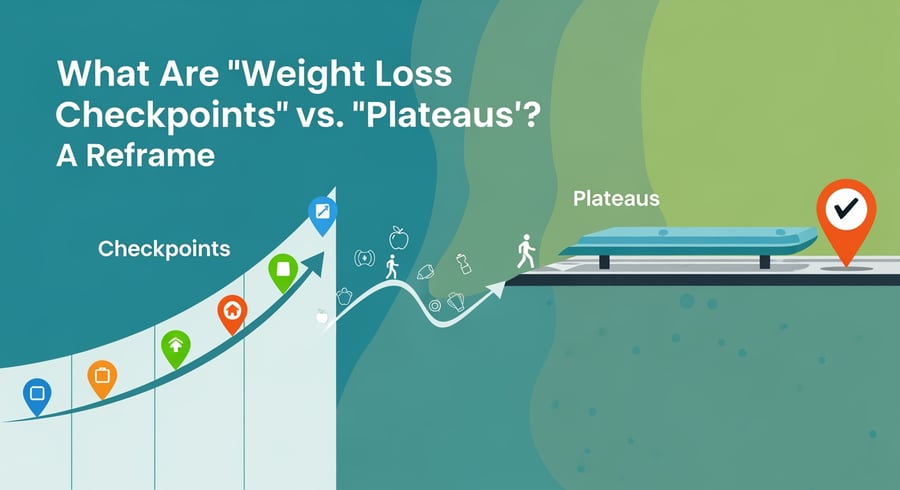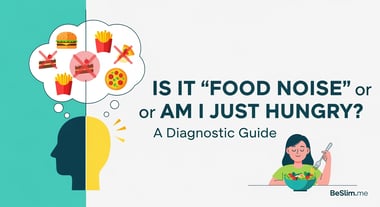Hello, I'm Master Kim, your Behavioral Psychologist and Solution Consultant at BeSlim.me. If you've ever felt stuck in your weight loss journey, staring at the scale that refuses to budge, you're not alone. This frustration is completely normal—it's a shared experience for so many committed to healthier lives. Today, let's reframe those dreaded "plateaus" as "weight loss checkpoints." This mindset shift, rooted in behavioral science, can transform how you approach these moments, turning potential setbacks into opportunities for growth and deeper self-understanding. In this Q&A explainer, we'll dive into the psychology behind them, why they happen, and practical steps to navigate forward. Let's explore together.
Q1: What Exactly Is a 'Weight Loss Checkpoint' and How Does It Differ from a 'Plateau'?
A weight loss plateau is often seen as a frustrating stall—where despite your best efforts, the scale stops moving for weeks or even months. But what if we reframed it as a "checkpoint"? This isn't just positive thinking; it's a behavioral psychology tool to reduce self-blame and foster resilience. A checkpoint implies a natural pause for reflection, adjustment, and consolidation of progress, much like rest stops on a long road trip that allow you to refuel and recalibrate.
In essence, a plateau is the symptom, while a checkpoint is the empowering reframe. Psychologically, labeling it as a checkpoint activates a growth mindset, as described by psychologist Carol Dweck. Instead of feeling defeated, you view it as a signal to assess and adapt. This shift can lower stress levels, which, as we'll discuss, play a huge role in weight management. Scientifically, plateaus often stem from metabolic adaptations where your body adjusts to lower calorie intake by slowing metabolism to conserve energy—a survival mechanism from our evolutionary past.
Hormonally, this involves changes in leptin (the "fullness" hormone) and ghrelin (the "hunger" hormone), which can make sustained weight loss feel like an uphill battle. According to research on metabolic adaptation during weight loss, your body may reduce energy expenditure by up to 15-20% after significant weight loss, creating a natural "set point" resistance. But remember, this is your body's way of protecting you, not sabotaging you. By calling it a checkpoint, we honor this biology while empowering behavioral changes to push through.
Q2: Why Do Weight Loss Checkpoints Happen? The Psychological and Behavioral Reasons
The 'Why' Diagnosis
Weight loss checkpoints aren't random failures—they're deeply rooted in psychological, behavioral, and hormonal factors. Let's break this down accessibly, drawing from behavioral science to help you understand without overwhelm.
First, consider the habit loop from Charles Duhigg's framework in behavioral psychology. When you start a weight loss journey, you build new habits like consistent exercise or mindful eating. But as these become routine, your brain's reward system (involving dopamine) adapts, and the initial excitement fades. This can lead to "willpower depletion," a concept where repeated self-control efforts drain your mental energy, making it harder to stick with changes. It's like a muscle that tires out—scientifically linked to glucose levels in the brain, as shown in studies on ego depletion.
Hormonally, chronic stress plays a villainous role. When stressed, your body releases cortisol, the "stress hormone," which can trigger fat storage, especially around the abdomen, and increase cravings for comfort foods. This stress-cortisol link explains why emotional hurdles often coincide with checkpoints; it's not laziness but a biological response. For instance, studies on cortisol and weight gain from the Mayo Clinic highlight how prolonged stress disrupts metabolism and promotes overeating as a coping mechanism.
Behaviorally, checkpoints often arise from "all-or-nothing" thinking—a cognitive distortion where minor slip-ups (like missing a workout) feel like total defeat, leading to demotivation. This ties into self-efficacy theory by Albert Bandura, where belief in your ability to succeed wanes during stalls, creating a vicious cycle. Add in external factors like sleep deprivation or inconsistent routines, and your body enters a conservation mode, slowing progress to maintain homeostasis.
The good news? These aren't permanent barriers. Research shows that understanding these mechanisms—psychological (habit adaptation), behavioral (willpower fatigue), and hormonal (cortisol spikes)—empowers 70-80% of people to break through, per longitudinal weight loss studies. By diagnosing the "why," you're already reframing the checkpoint as a teachable moment, not a roadblock.
Q3: How Can I Overcome a Weight Loss Checkpoint? Actionable Strategies
Actionable Solutions
Navigating a weight loss checkpoint requires sustainable behavior changes, not quick fixes. Below, I'll outline five specific, step-by-step strategies rooted in behavioral science. Each includes practical examples to make them immediately implementable. Focus on one or two at a time to build momentum without overwhelm.
Strategy 1: Conduct a Habit Audit to Reset Your Routine
Start by identifying what's working and what's stalled— this disrupts autopilot behaviors and rebuilds self-efficacy.
- Track your daily patterns: For one week, log your meals, exercise, sleep, and stress levels in a simple journal or app. Note patterns, like skipping breakfast leading to evening snacking.
- Identify one small tweak: Choose an easy win, such as adding a 10-minute walk after dinner to boost metabolism without overhauling your day.
- Set a reminder system: Use phone alerts or habit-stacking (e.g., walk while listening to a podcast) to make it stick.
Example: Sarah, a busy mom, audited her habits and realized late-night scrolling triggered mindless eating. By swapping it for herbal tea and journaling, she broke the loop and lost 2 pounds in two weeks.
Strategy 2: Manage Stress to Balance Hormones
Since cortisol fuels checkpoints, proactive stress reduction can recalibrate your body's response.
- Practice daily mindfulness: Spend 5-10 minutes on deep breathing or meditation apps like Headspace to lower cortisol levels.
- Incorporate stress-busting activities: Schedule one relaxing ritual, like a warm bath or nature walk, three times a week.
- Monitor progress: Track how reduced stress affects hunger—aim for fewer cravings as a sign it's working.
Example: John, dealing with work stress, started a 5-minute breathing exercise before meals. This cut emotional eating, helping him push past a month-long checkpoint. As noted in NIH research on stress management and weight control, such techniques can improve hormonal balance and sustain weight loss.
Strategy 3: Reframe Your Mindset with Positive Self-Talk
Combat all-or-nothing thinking by building a growth-oriented narrative.
- Challenge negative thoughts: When you think "I've failed," reframe to "This is a checkpoint— what can I learn?"
- Daily affirmations: Write and repeat three positives, like "I'm building lifelong habits" each morning.
- Celebrate non-scale victories: Track wins like better energy or fitting into old clothes to maintain motivation.
Example: Lisa felt defeated after a week without weight loss. By affirming her progress in energy levels, she stayed consistent and broke through in the next month.
Strategy 4: Adjust Nutrition and Exercise Intelligently
Avoid drastic cuts; instead, make evidence-based tweaks to outsmart metabolic adaptation.
- Cycle your calories: Alternate higher and lower calorie days (e.g., 2000 on active days, 1600 on rest) to prevent metabolic slowdown.
- Incorporate strength training: Add two 20-minute sessions weekly to build muscle, which burns more calories at rest.
- Reassess portions mindfully: Use smaller plates or measure servings to gently reduce intake without feeling deprived.
Example: Mike hit a checkpoint after losing 15 pounds. By adding weightlifting and cycling calories, his metabolism revved up, leading to steady progress.
Strategy 5: Build a Support Network for Accountability
Social support enhances behavioral adherence, making checkpoints easier to navigate.
- Find an accountability partner: Share goals with a friend or join a community like BeSlim.me forums.
- Schedule check-ins: Weekly calls or messages to discuss wins and challenges.
- Seek professional guidance: Consult a coach for personalized tweaks if needed.
Example: Emma joined an online group and shared her checkpoint struggles. The encouragement helped her implement small changes, resulting in renewed weight loss.
These strategies emphasize sustainability—aim for 1% better each day. Implementing them can turn checkpoints into catalysts for lasting change.
Q4: Are Weight Loss Checkpoints Inevitable, and How Long Do They Last?
Yes, checkpoints are a normal part of most weight loss journeys, affecting up to 90% of people according to long-term studies. They typically last 2-6 weeks but can extend if unaddressed. The key is patience; rushing often leads to yo-yo dieting, which harms metabolism. Factors like age, starting weight, and consistency influence duration—older adults or those with higher initial BMI may experience longer ones due to slower metabolic rates. Behaviorally, viewing them as temporary builds resilience; hormonally, consistent habits eventually reset your body's set point. Remember, progress isn't linear—it's a series of checkpoints leading to your goal.
Q5: What If I Keep Hitting Checkpoints? When Should I Seek Help?
Repeated checkpoints might signal deeper issues like thyroid imbalances or unsustainable habits. If they persist beyond 8 weeks despite efforts, consult a doctor to rule out medical causes. Behaviorally, this could indicate burnout— reassess your plan for enjoyment. At BeSlim.me, we offer personalized consultations to refine your approach. You're capable of overcoming this; persistence pays off.
In closing, remember that every weight loss checkpoint is a testament to how far you've come—it's your body's way of saying, "Let's pause and strengthen." Change is absolutely possible with patience, science-backed strategies, and self-compassion. You've got this; keep moving forward, one mindful step at a time. If you have more questions, I'm here at BeSlim.me to support you.
References
- Research on metabolic adaptation during weight loss - pubmed.ncbi.nlm.nih.gov
- Studies on cortisol and weight gain from the Mayo Clinic - mayoclinic.org
- NIH research on stress management and weight control - niddk.nih.gov
Medical Disclaimer
The content on this website is for informational and educational purposes only. It is not intended as medical advice and should not be relied upon as a substitute for consultations with qualified healthcare professionals who are familiar with your individual medical needs. Always seek the advice of your physician or other qualified healthcare provider with any questions you may have regarding a medical condition. Never disregard professional medical advice or delay in seeking it because of something you have read on this website.




